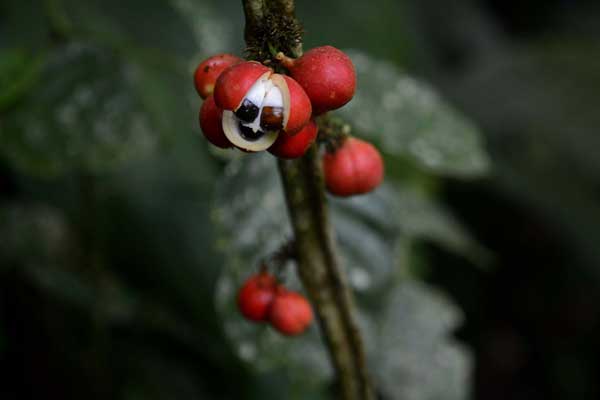Guarana is a climbing vine native to the lush Amazon rainforest in Brazil and countries across South America. The plant is best known for its caffeine-packed seeds, which have been used for centuries by indigenous tribes as a natural energizer and brain booster. In this comprehensive guide, we’ll explore guarana’s origins, chemical composition, potential benefits, side effects, and more.

The guarana vine, scientifically named Paullinia cupana, produces a fruit around the size of an eyeball. Inside this fruit are dark brown seeds that resemble coffee beans. These energizing seeds form the basis of guarana powders, capsules, teas, and supplements used today.
Guarana has been dubbed ‘Amazonian caffeine’ thanks to its exceptionally high caffeine content – up to 7% by weight, over twice the amount in coffee beans. Beyond caffeine, guarana is also rich in tannins, theobromine, theophylline, flavonoids, and other beneficial plant compounds.
For centuries, indigenous Amazonians like the Sateré-Mawé tribe have used guarana seeds to boost energy, alertness, and stamina. The Sateré-Mawé even attribute the vine’s origins to a legend involving a deity killing a beloved village child.
Today, guarana remains integral to Amazonian medicine and culture. Meanwhile, its popularity has skyrocketed worldwide as an ingredient in energy supplements, beverages, weight loss products, and even beauty formulas.
But what exactly makes this exotic Amazonian vine so energizing and medicinal? Read on to learn all about guarana’s origins, traditional uses, chemical makeup, potential benefits, safety precautions, and more.
Traditional Uses of Guarana in the Amazon Rainforest
For hundreds of years, Amazonian tribes like the Sateré-Mawé, Maués and Guaraní have treasured guarana for its energy-enhancing effects. Traditional uses include:
- Improving alertness and stamina during hunting trips in the jungle
- Reducing fatigue and sleepiness
- Heightening sensory perception
- Boosting mood
- Curtailing appetite
- Aiding gastrointestinal issues
According to folklore, guarana also holds sacred properties. Indigenous groups incorporated the vines into religious rituals, ceremonies, and dances. Shamans powdered the seeds to produce black body paint to adorn skin during spiritual gatherings.
The word ‘guarana’ is derived from the Sateré-Mawé term ‘warana’, meaning ‘fruit like the eyes of the people’. This refers to the fruit’s eye-like appearance when the black seeds are visible through the berry’s outer layer.
Guarana’s revered status persists today, with the plant remaining integral to Amazonian medicine and tribal identity. Many communities still grow, harvest, and process guarana using ancient methods passed down intergenerationally.
Key Chemical Compounds in Guarana
So what exactly gives guarana its touted stimulant powers? Let’s explore its main bioactive compounds:
Caffeine
Guarana seeds can contain up to 7-8% caffeine by weight, over twice the caffeine of coffee beans. Caffeine provides guarana’s energy-boosting effects by stimulating the central nervous system. It blocks adenosine receptors in the brain, reducing sleepiness while improving alertness, reaction time, and concentration.
Theobromine
Like caffeine, theobromine is another natural stimulant in the methylxanthine class. Guarana contains around 2-4% theobromine, which amplifies its energizing and cognitive-enhancing effects.
Theophylline
This is a natural compound chemically related to caffeine and theobromine. It is present in guarana at around 1.3%. Theophylline relaxes smooth muscles in the airways and blood vessels, and may support heart and respiratory function.
Tannins
Also known as tannic acid, these are water-soluble polyphenols that give guarana its astringent taste. Tannins act as antioxidants that may help reduce inflammation.
Saponins
These are naturally-occurring glycosides that create a soapy lather when mixed with water. In guarana, saponins provide antioxidant and anti-inflammatory effects.
Flavonoids
Guarana contains antioxidant polyphenols like catechins, epicatechins, and proanthocyanidins. These plant-based micronutrients support heart health and neutralize cell-damaging free radicals.
Other Compounds
Guarana also provides smaller amounts of fatty acids like linoleic acid, coumarins, resin, starch, protein, and fiber. This diverse chemical makeup underlies its broad therapeutic potential.
Potential Health Benefits of Guarana
While human studies are still limited, preliminary research indicates guarana may offer certain benefits:
Increased Energy and Reduced Fatigue
Without a doubt, guarana’s most well-established effect is boosting energy and combatting tiredness. Its high caffeine content stimulates the central nervous system, triggering the release of excitatory neurotransmitters. This leads to enhanced alertness, improved cognitive function, and reduced fatigue.
For this reason, guarana is a popular ingredient in energy drinks like Red Bull and Monster. A 2019 systematic review found that energy drinks with guarana reduced sleepiness more than caffeine alone in partially sleep-deprived adults.
Enhanced Athletic Performance
Through its energizing properties, guarana may enhance certain measures of exercise performance like endurance, strength, and muscle power output. A 2015 study found cyclists performed better during a 150km trial when supplementing with guarana. Meanwhile, a 2016 paper reported increased muscle endurance in participants who took guarana.
Its caffeine content could support athletic performance by mobilizing fatty acids, reducing perceived exertion, and delaying mental and physical fatigue. However, more studies are needed using randomized controlled trials in athletes to confirm guarana’s ergogenic effects.
Potential Weight Loss Aid
By boosting metabolism and thermogenesis, guarana may support modest weight loss – especially when combined with exercise and a healthy diet. Researchers attribute its slimming effects to caffeine and plant compounds called methylxanthines.
One study gave overweight adults either a mixture including guarana, or a placebo. After 8 weeks, the guarana group lost significantly more weight and belly fat compared to placebo. However, there’s insufficient clinical evidence that guarana alone can produce significant weight loss.
Improved Cognitive Function
Through stimulating effects on the central nervous system, guarana may enhance aspects of short-term cognitive performance like memory, alertness, attention span, and reaction time.
A 2018 randomized controlled trial found improved cognitive performance in elderly volunteers who consumed guarana extract daily for 28 days. The researchers suggested guarana could support normal age-related cognitive decline. However, more rigorous clinical studies are needed.
Potential Mood Support
By increasing levels of mood-regulating neurotransmitters like dopamine and serotonin, guarana may promote positive mood and affect. This is attributed to the activity of caffeine and methylxanthines.
One interesting study investigated how guarana affected the mood of human volunteers anticipating a stressful public speaking task. Compared to placebo, guarana decreased anxiety and improved scores on a cognitive battery test.
Antioxidant Effects
Guarana is a source of tannins, saponins, epicatechins, and other antioxidant plant compounds. These micronutrients help neutralize destructive free radicals that can damage cells. By so doing, they may offer protection against chronic inflammation, heart disease, neurodegeneration, and DNA damage.
Some Other Suggested Benefits
Early research hints that guarana may also:
- Possess antimicrobial effects against certain bacteria and fungal strains
- Reduce menstrual cramps and symptoms of PMS
- Alleviate digestive complaints like diarrhea
- Lower LDL (‘bad’) cholesterol levels
- Improve blood vessel function and blood flow
- Combat cancer cell growth in test tube studies
However, these applications require substantially more high-quality human research to confirm guarana’s efficacy.
Potential Side Effects and Safety Precautions
When used appropriately, guarana is generally well tolerated by most healthy adults. However, potential side effects can occur, especially when excessive doses are consumed.
Potential adverse effects include:
- Jitteriness, tremors, and nervousness
- Rapid heart rate (tachycardia)
- Insomnia and sleep disruption
- Headaches
- Upset stomach, nausea or diarrhea
- Anxiety or irritability
Guarana should be avoided by those sensitive to stimulants like caffeine. Pregnant and breastfeeding women should not consume guarana due to lack of safety research.
Those with heart conditions, bleeding disorders, anxiety disorders, diabetes, and other medical issues should consult a doctor before using guarana.
How Much Guarana Should You Take?
Guarana supplements are commonly available in dosages ranging from 100-800mg per capsule. Multi-ingredient energy formulas may provide 50-100mg per serving.
A moderate dosage for most healthy adults is 100-200mg, up to twice daily. This equates to roughly 50-100mg caffeine, similar to a cup of coffee. Do not exceed 400mg guarana per day.
Always start with lower doses and avoid taking guarana late in the day to prevent sleep disruption. Use caution combining guarana with other stimulants like coffee, tea, or energy drinks.
Look for reputable brands tested for purity and quality. Work closely with your integrative healthcare provider to find an appropriate guarana regimen tailored to your health status and needs.
Conclusion
Guarana is a traditional Amazonian vine that holds legendary status among indigenous tribes who have used it for centuries. Its naturally caffeine-rich seeds confer powerful energizing and cognitive-enhancing effects.
Beyond its stimulating properties, early research suggests guarana may also promote weight loss, exercise performance, antioxidant activity, positive mood, and other wellness benefits.
When used moderately and appropriately, guarana is generally safe for most healthy adults. But side effects can occur if excessive doses are consumed, especially in sensitive groups.
While guarana shows therapeutic potential, many supposed benefits still require more rigorous human trials to fully validate. But one thing is certain – this exotic Amazonian vine will continue spreading its legendary ‘wings of energy’ far beyond South America.
